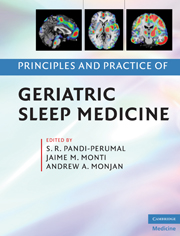Book contents
- Principles and Practice of Geriatric Sleep Medicine
- Principles and Practice of Geriatric Sleep Medicine
- Copyright page
- Dedication
- Contents
- Contributors
- Foreword
- Preface
- Credits and acknowledgments
- Organization of the first edition
- About the editors
- Part 1 Sleep and normal aging
- Part 2 Neuroendocrine and homeostatic changes in the elderly
- 8 Neuroendocrinecorrelates of sleep in the elderly
- 9 Melatonin, aging, and Alzheimer’s disease
- 10 Sleep and diabesity in older adults
- Part 3 Sleepdisorders in the elderly
- Part 4 Treatment of sleep disorders in the elderly
- Index
10 - Sleep and diabesity in older adults
from Part 2 - Neuroendocrine and homeostatic changes in the elderly
Published online by Cambridge University Press: 04 August 2010
- Principles and Practice of Geriatric Sleep Medicine
- Principles and Practice of Geriatric Sleep Medicine
- Copyright page
- Dedication
- Contents
- Contributors
- Foreword
- Preface
- Credits and acknowledgments
- Organization of the first edition
- About the editors
- Part 1 Sleep and normal aging
- Part 2 Neuroendocrine and homeostatic changes in the elderly
- 8 Neuroendocrinecorrelates of sleep in the elderly
- 9 Melatonin, aging, and Alzheimer’s disease
- 10 Sleep and diabesity in older adults
- Part 3 Sleepdisorders in the elderly
- Part 4 Treatment of sleep disorders in the elderly
- Index
Summary
- Type
- Chapter
- Information
- Principles and Practice of Geriatric Sleep Medicine , pp. 107 - 120Publisher: Cambridge University PressPrint publication year: 2009

